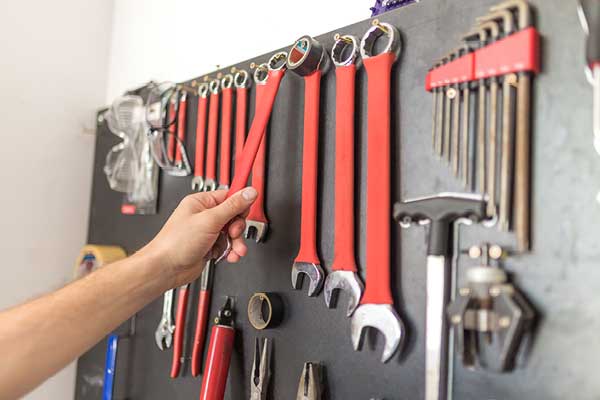Garage safety 101

Did you know your garage is probably one of the most dangerous parts of your home? After all, it’s the keeper of all things from sports equipment to hazardous materials to power tools – it’s essentially a home’s storage facility.
So just how safe is your garage? Answer these four questions to find out.
1. Are hazardous materials locked up?
Garages are often used to store a variety of hazardous and toxic materials like gasoline, paint, fertilizers, pesticides and cleaning solutions, just to name a few. Keep these materials in a safe spot – either up high and out of the reach of children and pets or in a locked cabinet. And when you need to dispose of these hazardous materials, make sure you take them to your local recycling or disposal location – don’t just throw them in the trash.
2. Is your garage cluttered?
Not only does garage clutter make it difficult to find things, it also poses several safety hazards. For example, clutter that’s stacked too high could fall over and injure someone. Too much clutter (especially boxes, newspapers and hazardous materials) makes your garage more of a fire hazard. And leaving too much clutter on your garage floor is a tripping hazard. Declutter and spruce up your garage by investing in a garage storage system, such as shelving units.
3. Are your tools stored safety?
You never know when an unsupervised child might want to try out that big, fancy power drill, so storage cabinets with locks are the ideal solution and can also keep your stuff out of sight from thieves. For bigger tools that won’t fit in a cabinet, such as table saws, make sure their safety locking mechanisms are on.
But what about rakes, shovels and garden pruners? Their sharp edges are safety hazards when they aren’t safely stored. Securely hanging these types of things on the garage wall is an easy way to keep you and your family out of harm’s way.
4. Do you have a fire extinguisher in your garage?
Most people have a fire extinguisher in their home but don’t always think to put one in the garage. During a fire, every second counts, so it’s important to have an extinguisher nearby in case of an emergency. And don’t forget about a smoke/carbon monoxide detector – your garage should have one of those, too.
So how did you do? If you don’t like your answers to these questions, you may want to take a trip to your local hardware or home improvement store.